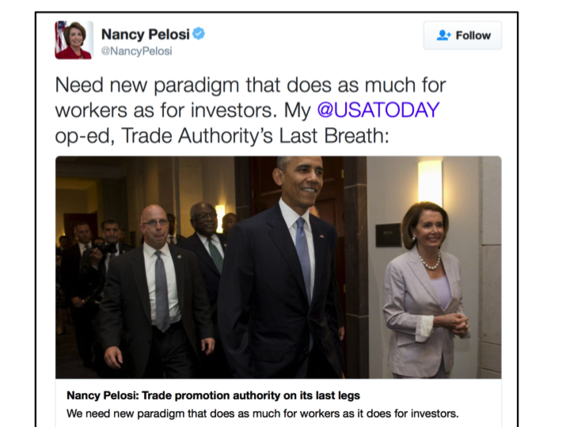
This article originally appeared at The Huffington Post.
This year’s political campaign has forced the economics profession to reconsider the fraying orthodoxy of free trade.
Last week, Martin Khor documented the shift in thinking by several economists. In particular, the new [North American Free Trade Agreement]-style trade deal— the Trans-Pacific Partnership—is in deep trouble. Khor makes the key economic point:
[Free] trade...can cause net losses under certain conditions. The gains from having cheaper goods and more exports could be more than offset by loss of local businesses, job retrenchments and stagnant wages.
An influential economist from the Obama administration, Jared Bernstein, says the end of the free trade era is a good thing:
We should no longer buy the statistically strained arguments about [free trade policies] delivering growth and jobs. The evidence just isn’t there, a fact not lost on those campaigning for president.
He then faces a fundamental political fact that is hard for economists to see, but is pretty obvious to opponents of NAFTA-style trade deals. It is increasingly obvious to voters: Trade deals are more about politics than economics. Bernstein continues:
First and foremost, don’t conflate trade with trade agreements. They’re not at all synonymous....the absence of new [free trade agreements] is an opportunity to refocus our trade policy on workers and more balanced trade. Besides the loss of public trust, cramped FTA negotiations have blocked us from taking necessary steps against currency manipulation and have diminished our focus on policies that could rebuild the manufacturing sector.
Bernstein takes the next step—new free trade deals make things worse:
So we should welcome the end of the era of FTAs, which had long devolved into handshakes between corporate and investor interests on both sides of the border, allowing little voice for working people.
For years, Nobel prize-winning economist Joseph Stiglitz has said free trade agreements set the wrong rules for globalization. He warns that TPP might be "the worst trade agreement in decades," because it would "reward the powerful and punish the weak." He hopes for "the death of TPP."
Another Nobel economist, Paul Krugman, sees a backlash against globalization (as we’ve managed it) getting real political traction:
...It’s also true that much of the elite defense of globalization is basically dishonest: false claims of inevitability, scare tactics (protectionism causes depressions!), vastly exaggerated claims for the benefits of trade liberalization and the costs of protection, hand-waving away the large distributional effects that are what standard models actually predict. I hope, by the way, that I haven’t done any of that; I think I’ve always been clear that the gains from globalization aren’t all that [big]; and I think I’ve never assumed away the income distribution effects.
Krugman uses economic jargon—“distribution effects”—to describe public policies that favor the wealthy, while moving jobs offshore and taking market power away from millions of workers.
Trade, as much as any public policy, makes winners and losers. The millions of workers hurt by our trade policy are responding to the political messages from the candidates.
In politics, when a public policy increases inequality, expands rights and power for global companies, makes work more precarious, hobbles our response to climate change and deindustrializes Indiana, Michigan, Pennsylvania and Ohio, we call that a bad policy.
TPP and other NAFTA-style trade deals are bad policy. We could have different rules for globalization.
Paul Krugman connects the economic and political realities:
So the elite case for ever-freer trade is largely a scam, which voters probably sense even if they don’t know exactly what form it’s taking....But it is fair to say that the case for more trade agreements—including TPP, which hasn’t happened yet—is very, very weak. And if a progressive makes it to the White House, she should devote no political capital whatsoever to such things.
Former Treasury Secretary Larry Summers is the quintessential establishment economist. He is identified with many of the policies that are causing so much trouble today. Last month, he made my head explode, when acknowledged growing mistrust in the way we’ve managed globalization:
...A revolt against global economic integration is underway in the West....the core of the revolt...is a sense—unfortunately not wholly unwarranted—that it is a project carried out for the elites, with little consideration of ordinary people. They see the globalization agenda as being set by large companies....They see the kind of disintegration that accompanies global integration as local communities suffer when major employers lose out to foreign competitors.
Summers backs away from new trade deals and makes a startlingly positive proposal for a different approach to managing globalization:
This would mean a shift from international trade agreements,...[to one where] issues such as labor rights and environmental protection would be central, while issues related to empowering foreign producers would be secondary....And it would mean an emphasis on the challenges of middle-class parents everywhere who still hope desperately that their kids can have better lives than they did.
Summers doesn’t quite drive the nail down to the wood. I will.
We can construct a better trade policy. We can design policies to manage globalization more sustainably and more equitably—only if we stop TPP and put a new process in place. Paraphrasing Naomi Klein, TPP is the "no" that must be said before the "yes." We cannot tweak TPP into a workable policy.
In the fast track debate, Nancy Pelosi said she would gladly support a trade policy that does as much for workers and the environment as it does for investors and global companies. She also said we would need a new process to accomplish that.
After 20 years of lived experience with bad trade policy, and with the voice of candidates and voters, we now have that opportunity.

